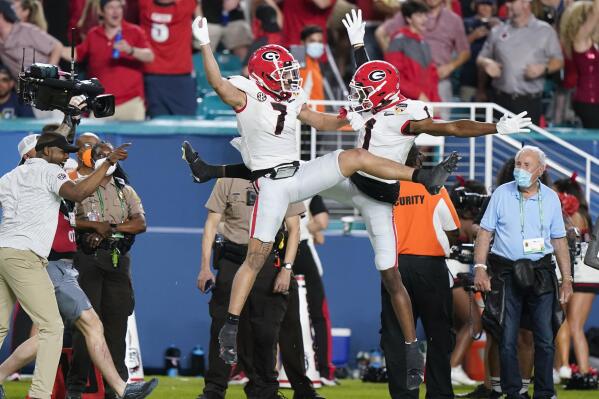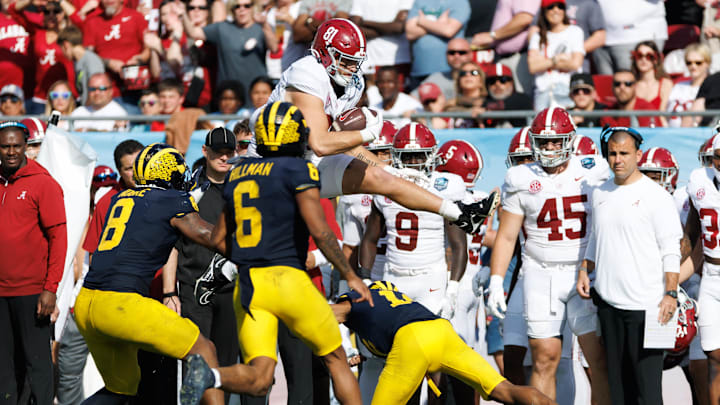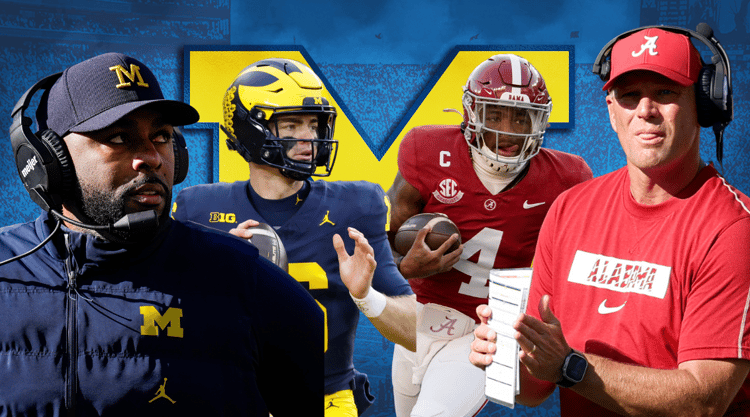In a thrilling college football showdown that captivated fans nationwide, Michigan’s defensive front stood tall and delivered a dominant performance against Alabama, securing a monumental upset. The Wolverines’ defense, especially their defensive line, made an indelible mark on the game with their relentless pressure and overwhelming presence. After the final whistle, Michigan’s defensive players made one thing clear: “Dawgs will always be on this D-line.” The statement was a bold declaration of their tenacity, strength, and unbreakable resolve in the trenches, a phrase that would go down in history as a symbol of their hard-fought victory.
The game was billed as a clash of two powerhouse programs—Michigan, with their tough, gritty reputation, and Alabama, with its history of dominance. The stakes were high, and the expectations were greater, but it was Michigan’s defensive front that would ultimately seize control of the game. Throughout the contest, the Wolverines’ defensive line displayed a level of physicality and energy that overwhelmed Alabama’s offensive line, disrupting the Crimson Tide’s offensive flow and neutralizing their star players.
From the opening whistle, Michigan’s defensive front, led by their relentless pass rushers and run-stoppers, made their presence felt. The Wolverines’ defensive line routinely found ways to collapse the pocket and force Alabama’s quarterback to make rushed decisions. This kind of pressure disrupted Alabama’s rhythm, forcing them to abandon their game plan and struggle to move the ball efficiently. It wasn’t just about getting sacks; it was about controlling the line of scrimmage, maintaining discipline in their gaps, and overpowering the Alabama offensive line at every turn.
The phrase “Dawgs will always be on this D-line” is not merely a catchphrase; it represents the mentality of Michigan’s defensive front. The term “Dawgs” is a nod to their dogged determination, the kind of mentality that refuses to back down, that thrives under pressure, and that relishes the physical, gritty nature of the game. The Wolverines’ defensive line embodied this spirit, constantly attacking Alabama’s offensive line with ferocity and purpose. Their relentless pursuit of the quarterback and their tenacity in stopping the run created a wall that Alabama simply could not breach.
The Wolverines were particularly successful in keeping Alabama’s running backs in check, a group that had been known for its ability to break off big gains. Michigan’s defensive line shut down running lanes, forcing Alabama to rely more heavily on their passing attack—something the Wolverines were more than happy to defend against. As the game wore on, Alabama’s offensive line began to show signs of fatigue, succumbing to the punishing hits delivered by Michigan’s defensive front.
The defensive line’s ability to stymie Alabama’s offense was not just about physical dominance, though. It was about preparation, discipline, and execution. Michigan’s defensive coordinator had crafted a game plan that played to the strengths of his defensive line. The front four, complemented by linebackers who were quick to support, were able to stifle Alabama’s offensive schemes with clever stunts, timely blitzes, and exceptional technique. The result was an Alabama offense that seemed out of sync and unable to find any rhythm.
The Wolverines’ success wasn’t just about the stars, either. Every player on Michigan’s defensive front contributed to the victory. Whether it was a young defensive lineman getting his first taste of national exposure or an experienced veteran leading by example, the collective effort was apparent. The unit played with a shared sense of purpose, understanding that their success was tied to their unity and their collective will. This sense of togetherness on the defensive line was reflected in their post-game comments. “Dawgs will always be on this D-line,” the players proclaimed, highlighting not only their individual pride but their loyalty to the team and the ethos of Michigan football.
In addition to their defensive dominance, Michigan’s defensive line made critical plays at key moments. A series of timely sacks, batted passes, and tackles for loss left Alabama scrambling to find an answer. The Wolverines didn’t just stop Alabama; they demoralized them, forcing the Tide to play at a pace and level that was uncomfortable and unfamiliar. Every time Alabama looked to gain momentum, Michigan’s defense was there to snuff it out, shutting the door with ruthless efficiency.
The upset victory over Alabama marked a significant moment in Michigan’s football history. It demonstrated that the Wolverines were not just a team of tradition but a team capable of dominating the best of the best. Their defensive front was the heart of that victory, and the declaration, “Dawgs will always be on this D-line,” will undoubtedly be remembered as a rallying cry for future Michigan teams. The phrase embodies not only the pride and legacy of Michigan football but the unyielding spirit of a defensive line that proved they could go toe-to-toe with anyone, no matter how high the stakes.
For Michigan’s defense, this victory over Alabama was more than just an upset—it was a statement. It was a statement that the Wolverines were a force to be reckoned with and that their defensive line, as their players proudly declared, would forever remain a dominant presence. The “Dawgs” were here to stay, and they were not going anywhere.













